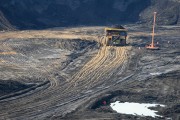No new coal and no new oilsands projects if you can't prevent the carbon going into the atmosphere. That is the message that eminent climate scientist Dr. James Hansen brought to Alberta, the heart of the oil industry in Canada, yesterday.
To prevent the climate system from running amok, it's critical to stop using coal and to avoid growing carbon emissions that would come from unconventional oil such as oilsands, the NASA scientist said.
Hansen was in Edmonton, Alberta testifying before a Joint Federal and Provincial panel that is reviewing the proposed Total E&P Joslyn oilsands mining project. Hansen delivered his message to a room packed with oil industry representatives. Before the day was over, the Joint Panel was actually engaging Dr. Hansen in a discussion about cleaner energy solutions.
Hansen wrote about climate change in Science magazine back in 1981, when he warned carbon dioxide levels were already increasing and that temperatures were already rising. His prediction that the Northwest Passage would eventually open up has already come to pass.
[youtube:b3rzkN2B4-w,width=250]
By 1988, Hansen's global model was predicting a 4 C rise in temperature from a doubling of CO2 in the atmosphere. "We now know that sensitivity is three degrees instead of four degrees," said Hansen, explaining that the science is now stronger than ever.
By 2008, CO2 concentrations reached 389 ppm, and the effects of climate change are "now observable," said Hansen. The Arctic sea ice is down 35 per cent in just three decades, and mountain glaciers are melting fast. "Glacier National Park in the U.S. may have no glaciers in 25 to 35 years," said Hansen. "Climate change could drive a million species to extinction."
Hansen's key message was that fossil fuels only appear to be cheap because the price does not include the real costs to health care, environmental damage and climate change. The carbon we put into the atmosphere will cost future generations $200 to $400 per tonne to remove, he predicts.
"The solution is actually quite simple," says Hansen. "We must put a price on carbon and raise it over time until it reflects the real cost of fossil fuels." He says the money raised must all go back to the people. If this is done well, Hansen says it could transform the economy.
Dr. Hansen was testifying at the panel hearing into the Total E&P Joslyn oilsands mine project for the Oilsands Environmental Coalition, of which the Pembina Institute is a member. A full copy of the Oilsands Environmental Coalition submission, which argues the project is not in the public interest, is here.









